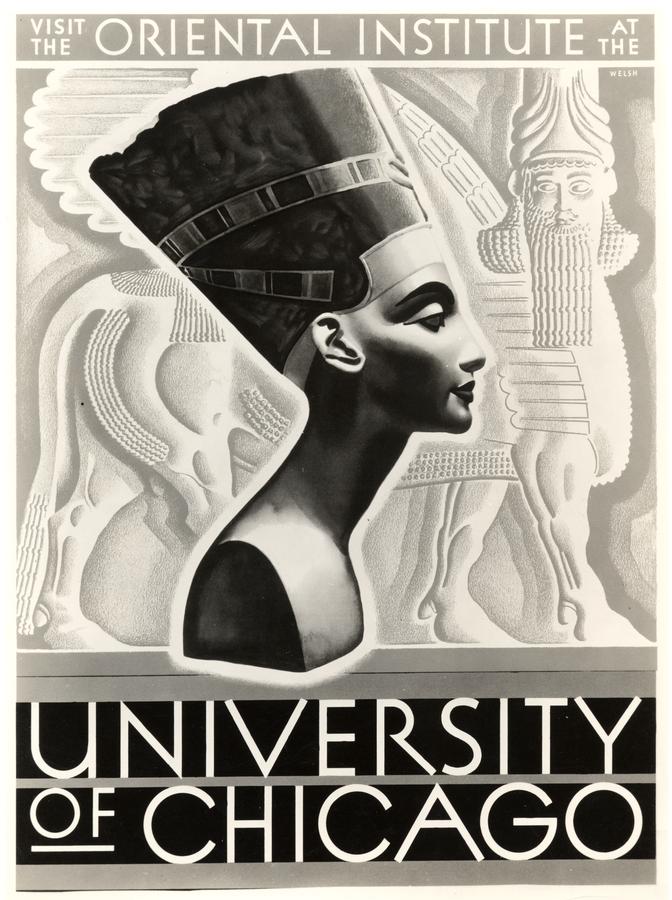The following is reprinted in its entirety from Access [the staff newsletter of the University of Chicago Library] Vol. XXXVI, No. 23, November 11, 1988. It also appeared as an appendix to the October-November 1988 Oriental Institute Research Archives Acquisitions list (December 5, 1988).
JOHANNE VINDENAS REMEMBERED
Robert Wadsworth, our former Bibliographer for English, Librarianship, and General Humanities, has written the following remembrance of Johanne Vindenas (April 28, 1899 - October 21, 1988).
The death of Johanne Vindenas is a reminder of one of the most impressive careers at the University Library, extending over a period of forty years.
She was born in Norway, the daughter of a clergyman in the (Lutheran) state church. As the family moved from parish to parish during her youth, she became familiar with various parts of the country while she completed a thorough Continental education. In 1918 she passed the Examen artium in the Cathedral School of Kristiansand, and in 1920 she was awarded the certificate from the School of Librarianship in Oslo. With money advanced by her father she came to America and entered the New York State Library School, taking the certificate in 1924. Her long association with the Oriental Institute began in the same year, and she remained there until she reached the age of retirement in 1964 and returned to Norway to live.
She never ceased to be a patriotic Norwegian proud of her native land, but she was also a loyal American citizen and a conscientious voter. Long after her return to Norway one of her letters expressed outspoken disapproval of a current anti-American demonstration.
Her forty years with the Oriental institute Library coincided with the growth of that collection as one of the key resources for the study of the ancient Near East. In its early years the Institute Library was administered apart for the General Library, and Miss Vindenas developed her own procedures and standards in considerable independence. Never given a large staff, she had firsthand experience in every aspect of librarianship from basic drudgery to delicate professional decisions. Like all educated Norwegians, she was at home in several languages, and she received additional instruction from the Institute faculty. She studied catalogues and lists, prepared and checked her own orders, and, working with a quaintly old-fashioned typewriter that could be adapted for different alphabets, made her own catalogue cards. Much of her work was with Arabic, Persian, and Turkish, but the area collection involved many other languages. By the time the Oriental Institute Library became a departmental unit within the University Library, Miss Vindenas was in such thorough control of all technical details that little could be done for her by the general staff. She was a real "special librarian," and to the end of her career she kept her hand on all the particulars.
Partly because of this zealous devotion to her duties in Chicago, she never became a conspicuous figure in American librarianship at large. She had unusual knowledge and ability and, well able to hold her own, she could be a formidable antagonist; but she showed no interest in self-promotion or personal fame. Her entire professional effort had to do with her work at the Oriental Institute.
She was not a recluse. Besides her warm family tues in Norway she had close friendships in Chicago, and she took part in the social projects of the Library staff. After retirement she made a number of trips to America for visits to old friends.
Although she did nothing to advertise der accomplishments, they were duly recognized. . . . In 1970 the Catalogue of the Oriental Institute Library, University of Chicago appeared in sixteen large volumes, so that years after her retirement Miss Vindenas's meticulous cataloguing was preserved in printed form and made available to a wide public. In one published guide to the reference material this catalogue is described as "replete with analytics, including book reviews." and the writer adds that "long runs of some series are completely analyzed."
In the best sense of the word "JV" was a true perfectionist, driven by the compulsion to do her best. She stood for quality and workmanship and felt frustrated by anything that interfered with her own high standards. On of her faculty clients at the Institute made the half-humorous but admiring observation: "They don't make them like that anymore."
For those of us who remember her with affection, it is comforting to know that she maintained her independence to the age of eighty-nine and died peacefully in her sleep. We can take inspiration from her example and profit from the fine work she left us.
Sunday, February 3, 2008
Subscribe to:
Post Comments (Atom)





 Stumble It!
Stumble It!


No comments:
Post a Comment